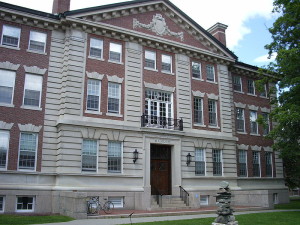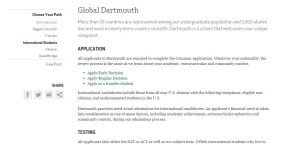
McNutt Hall – home of Dartmouth’s admissions and financial aid offices. This prominent 1904 building located along the Green is now that much more out of reach for low income international applicants.
“Building on our more than three-fold increase in financial aid since 1998,” commented Dartmouth President James Wright in a January 22, 2008 press release, “I am pleased that we could make this further enhancement to our financial aid program as we seek to keep Dartmouth affordable and to enroll the most talented students from around the world.” The “further enhancement to our financial aid program” President Wright referred to nearly seven years ago included, among other expansions to the College’s financial aid program, the extension of a need-blind admission policy to international students. That fateful winter press release put Dartmouth on the map of elite higher education. The College joined many peer schools – including most of its fellow Ivy League institutions – in making the College equally accessible to students from Los Angeles to Lagos.
According to a letter submitted to DartBlog dated September 11, 2015 to Dartmouth alumni interviewers and volunteers from the office of admissions, the College has reversed this nearly seven yearlong policy. Along with SAT and ACT scores, academic transcripts, application essays, and extracurricular activities, an international student will now have his or her family’s financial status reviewed in the admission process, giving an advantage to international students who come from means. Domestic applicants’ family finances will remain unscrutinized in the admissions process. This silent policy shift greatly juxtaposes with President Wright’s triumphant press release to the Dartmouth and global community at large nearly a decade prior.
This quiet shift in admissions policy already made its way onto Dartmouth admissions’ website. Using Archive.org’s nifty internet archive Wayback Machine, The Dartmouth Review was able to uncover what this same – albeit less glossy – admissions website exclaimed almost a year ago in March, 2014:
“Dartmouth admits all students, including international and transfer applicants,” this now outdated admissions policy declared, “through a need-blind selection process and meets enrolling students’ full demonstrated financial need.”
The (much newer) website as of today, September 17, 2015:
The policy now states: “Dartmouth practices need aware admissions for international candidacies. An applicant’s financial need is taken into consideration as one of many factors, including academic achievement, extracurricular endeavors and community context, during our admissions process.”
What’s interesting is the fact that “undocumented” students residing in the United States are still beneficiaries of a need-blind admissions process. This is to say a low income international student can increase his or her odds of getting into Dartmouth with appropriate financial aid by overstaying an American six month visitor’s visa and thereby illegally immigrating to the United States.
This sudden policy shift is a rather interesting turn of events. These past couple years, the College has routinely underscored its record endowment gains and donations, including an anonymous nine-digit donation. And although Dartmouth’s most recent annual tuition hike has been lower than in past years, Dartmouth’s 2015 tuition and fees total – a tad over $67,000 per year – is about 60% higher than it was just a decade ago in 2005. In the post-Moving Dartmouth Forward era, it seems that the Administration considers new housing initiatives and OPAL administrators to be a better use of these funds than attracting the best and brightest students from around the global. One would think that international appeal and inclusivity would be significantly more important priorities for an ostensibly world class institution in an increasingly globalized world.



Be the first to comment on "Dartmouth No Longer Need-Blind for Internationals"